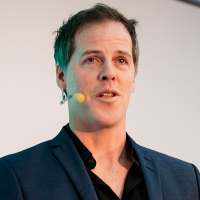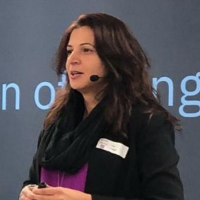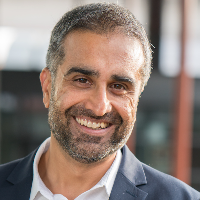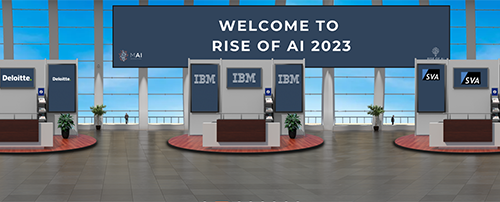Agenda
Meta Stage Live Stream
 May 10, 2023 10:00
May 10, 2023 10:00
Meta stage live stream
Click the join button to view
 May 10, 2023 10:00
May 10, 2023 10:00
10:00 - 10:30 Welcome & State of AI 2023
Opening Keynote and welcome by your host Fabian Westerheide.
An overview about the global AI landscape; review what has happened and outlook AI trends 2023.

Fabian Westerheide
CEO Rise of AI | Partner Asgard Capital
Fabian J. G. Westerheide, CEO of AI for Humans, is an international expert on Artificial Intelligence strategy, entrepreneur and venture capitalist
 May 10, 2023 10:30
May 10, 2023 10:30
How Universal are Foundation Models?
An international perspective on the most powerful AI

Prof. Dr. Hans Uzkoreit
Scientific Director at DFKI | Co-Founder & CTO Ginance Technologies
Hans Uszkoreit is Scientific Director at the German Research Center for Artificial Intelligence (DFKI) in Berlin. He is co initiator and Steering Board Member of LEAM.AI as well as Founder and Scientific Advisor at UNICEPTA Corporate Intelligence (formerly GIANCE). Uszkoreit has worked in AI for more than 35 years as professor, research leader and entrepreneur. He has authored/co-authored more than 250 publications in AI and computational linguistics and he is Member of the European Academy of Sciences. He has coordinated many national and international confederated projects and an international masters program in language and communication technologies . For his work on language understanding, he received two Google Research Awards.
 May 10, 2023 11:00
May 10, 2023 11:00
The Future Unlocked: AI and Quantum Computing Transforming the Digital Landscape
Keynote by Prof. Dr. rer. nat. Sabina Jeschke

Prof. Dr. rer. nat. Sabina Jeschke
CEO KI Park | CIO Quantagonia
Prof. Dr. Sabina Jeschke is a manager, founder and scientist. After more than 3 years as a board member for Digitization and Technology at Deutsche Bahn AG and a 12-year career as a university professor (Berlin, Stuttgart, Aachen), she founded the start-up Quantagonia GmbH (Quantum Computing) in December 2021. Since 10/2021 she is acting CEO of the start-up accelerator KI Park e.V. in Berlin. Since June 2021 she is supporting Deloitte Germany as a Scientific Senior Advisor in technology consulting. At the same time, she founded the StartUp Arctic Brains AB in Jämtland/Sweden in April 2021 with a focus on AI consulting and development. Sabina Jeschke is an experienced member of the supervisory board, most recently she accepted the mandate for Vitesco (carve-out from Continental) in 09/2021. She holds an honorary professorship at the TU Berlin and a CxO professorship at the FAU (Friedrich-Alexander-University Erlangen-Nuremberg).
 May 10, 2023 11:45
May 10, 2023 11:45
Can Germany be a technology leader in AI?
Panel about:
- What are the key ingridients to be future proof?
- Do we dare to take on technology leadership in Europe?
- How do we move from thinking to action?

Amira Gutmann-Trieb
Clustermanagerin IKT Berlin Partner

Jonas Andrulis
Founder & CEO Aleph Alpha
Aleph Alpha Founder & CEO Jonas Andrulis is a serial entrepreneur and former AI R&D manager at Apple’s Special Projects Division (SPG). For several years, Jonas has been at the forefront of the development towards transformative AI. His experience ranges from innovative academic experiments to building and operating petabyte machine learning pipelines for computer vision and language processing.

Jörg Bienert
President KI Bundesverband e.V.

Kai Zenner
Head of Office and Digital Policy Adviser European Parliament
Digital enthusiast focusing on Artificial Intelligence, data and the EU's digital transition. Soft spot for interinstitutional reforms and the better regulation agenda. Cooperative and pragmatic approach, always trying to strike a balance. Annoyed by stagnation, ideological mindsets and political power plays in the EU institutions and elsewhere. The good policy-maker is inclusive, willing to compromise and strives for constant renewal.
Graduated in politics and law, after specializing in Security Studies and Foreign Policy Analysis as well as in Constitutional and European Law. Studied Political Science (B.A.) at University of Bremen, Law (First German state examination / Dipl.-Jur.) at University of Freiburg / York / Münster, and International Relations (M.Sc.) at University of Edinburgh.
Started his professional life as Research Associate at the European Office of the Konrad-Adenauer-Foundation in Brussels, before moving to the European Parliament as Head of Office and Digital Policy Adviser for MEP Axel Voss (EPP Group) in mid-2017.
 May 10, 2023 14:00
May 10, 2023 14:00
Artificial Intelligence and Engery
Artificial intelligence (AI) is the study of intelligent agents that perceive their environment and compute predictions about the future states of the environment (“machine learning”) in order to automatically take actions in the environment that achieve their goal. While the first practical work on AI started right with the advent of computers in the early 60’s of the last century, methods of AI have now found wide-ranging applications in all parts of society. In this talk I will focus on the role that energy plays for AI and AI plays for energy; I believe that an energy-aware perspective is imperative for developing true artificial intelligence and that an AI-first approach is imperative for solving the challenge of transitioning to a sustainable future based on renewable energy. Up until today, the primary focus of research on AI methods has been on predictive accuracy and its dependence on the amount of training data rather than the amount of energy that is necessary. However, going forward, data is (typically) abundant for many tasks but energy is becoming a limiting and economical factor. Not being energy-efficient in AI algorithms is not sustainable in the long term, in particular as the amount and dependence on AI methods in people’s life is only going to increase while the amount of energy that is available to society remains constant.

Prof. Dr. Ralf Herbrich
Managing Director Hasso Plattner Institute (HPI)
Ralf Herbrich leads the group on Artificial Intelligence and Sustainability at the Hasso-Plattner Institute in Potsdam since May 2022. Previously, he served as Senior Vice President, Builder Platform & Artificial Intelligence at Zalando (2020 – 2022), Managing Director of the Amazon Development Center in Germany with its locations in Berlin, Dresden, Aachen and Tübingen and was Director of Machine Learning at Amazon in Berlin from (2013 – 2020). Prior to these roles at Amazon, he led Facebook’s Unified Ranking and Allocation team in 2011. From 2000 to 2011, he served as Director of Microsoft's Future Social Experiences (FUSE) Lab UK and worked for nine years at Microsoft Research Lab in Cambridge, UK.
 May 10, 2023 14:30
May 10, 2023 14:30
AI in Europe - the good news
Keynote by Björn Bringmann

Dr. Björn Bringmann
Managing Director | Lead AI Institute Deloitte Germany
 May 10, 2023 15:00
May 10, 2023 15:00
Responsible AI on the road to carbon neutrality: Leveraging energy-efficient Natural Language Processing in Public Service Media
While the excitement around recent advancements in AI and in particular with respect to Large Language Models has never been higher, concerns around privacy, their exponential increase in energy consumption and the associated costs have intensified as well. However, when looking at everyday high-volume use cases like search and recommendations, it is not the most powerful model or the highest company valuation that creates value for everyday people. These users rather care more about finding great content without searching for hours, and staying in control of their data, while the organizations serving them are looking to achieve this at scale in an affordable and sustainable way.
In this talk, Leif-Nissen Lundbæk and Andreas Grün will explore how to put AI firmly in the service of the general public, by prioritizing data privacy, energy efficiency and public value like diversity, transparency and serendipity, while providing millions of people with personalized fresh and relevant content every day - moving from big to small data and large to small language models that could run on a mobile phone instead of the latest super-computer.

Dr. Leif-Nissen Lundbæk
Co-Founder & CEO Xayn
Leif-Nissen Lundbæk, PhD is the Co-Founder and CEO of responsible AI company Xayn. In 2021, FORBES selected him for their German 30 Under 30 list. His work focuses on algorithms and applications for privacy-preserving and sustainable artificial intelligence. In 2017, he founded Xayn together with Professor Michael Huth and Felix Hahmann, to focus on redefining the standards around privacy, sustainability and cost efficiency in Natural Language Processing. Before founding Xayn, Leif-Nissen Lundbæk worked with Mercedes and IBM. He studied Economics, Mathematics and Software Engineering and received his master's degree with distinction at The University of Oxford as well as obtained his PhD at the Imperial College London.

Andreas Grün
Head of Technology Digital Media ZDF
Andreas Grün is Head of Technology in the Digital Media department at ZDF. He is responsible for the technological development of the ZDFmediathek with a focus on personalization, algorithms, automation and architecture. He is also responsible for the management of the AI project portfolio within the communication, planning and distribution departments. Before joining ZDF's IT department as a planning engineer in 2008, he worked independently for several years. Andreas holds a degree in Business Informatics from the University of Technology Darmstadt, Germany.
 May 10, 2023 15:45
May 10, 2023 15:45
How to Create and Grow AI Ecosystems
Panel
Moderator: Johannes Otterbach

Dr. Tina Klüwer
Entrepreneur | Member "Future Council" of German Government | Director K.I.E.Z
In 2022 Tina Klüwer was appointed to the Future Council of the Federal Chancellor Olaf Scholz. She is also head of the Research Transfer Working Group the German AI Association, member of the Board of AI Grid, and member of the Board of Directors of the KI-Park. Tina Klüwer was chairwoman of the Technological Sovereignty Advisory Council of the Federal Ministry of Education and Research (BMBF), an expert member of the German Bundestag's two-year Enquete Commission on Artificial Intelligence, a member of the advisory board `Young Digital Economy` of the Federal Ministry for Economic Affairs and Climate Action (BMWK), and part of the coordination group of the AI standardization roadmap of the Federal Ministry for Economic Affairs and Energy (BMWi) and DIN, as well as a member of the board of the German AI Association.

Alexandra Beckstein
Co-Founder & CEO QAI Ventures
Co-founder of QAI Ventures, a company focused on investment and acceleration of Quantum and AI startups. She is leading the investment activities and is also heading the company. In the QuantumBasel project, out of which the company was born, she was responsible for the strategy development as well as building the startup ecosystem. A geoscientist by training with advanced education in business and leadership she has worked in her professional career for both startups, SMEs and government. She was founder of her own company in Berlin in the field of renewable energy and is author of the book: "Bossing it- The future belongs to the bold." She is driven by the conviction that technology is a key to solving many global challenges and that ecosystems must replace the traditional ego-systems.

Thomas Neubert
Founder/Evangelist Transatlantic AI eXchange
Thomas Neubert is driving forward the transatlantic exchanges on AI, particularly supporting start-ups and medium-sized companies in Germany and the USA. He is an entrepreneur and global go-to-market expert who has founded several successful companies, including Transatlantic AI eXchange (TAIX) and WowDAO. TAIX, founded in January 2021, is a platform aimed at improving the global economic, social, and academic exchange between the USA and Germany in the field of AI. WowDAO is the first decentralized autonomous organization for the AI community, providing a blockchain-based, complete ecosystem of AI inventions. In addition to his entrepreneurial projects, Thomas has worked at Intel, Deutsche Telekom, and Logitech, where he was involved in numerous startup initiatives advancing desktop video conferencing, Robotics, VR/AR, Internet of Things and Datacenters. He is also a founding member of GABA, a non-profit business network, and co-founder of SVMC, the Silicon Valley Marathon Club. As a consultant, mentor, and investor, Thomas is committed to help individuals and startups achieve their potential.

Johannes Otterbach
VP Merantix Momentum
 May 10, 2023 17:00
May 10, 2023 17:00
No one should trust AI: How and why we govern production of intelligent artefacts
Trust is a relationship between peers – we choose not to micromanage others we believe are unlikely to work against our interests. AI is a system of techniques for creating artefacts capable of operating without our direct control, but how do we know which such artefacts will work in our interests? In this talk I start at the level of the artefacts and move up, considering cybersecurity, provenance, local and transnational corporations, as well as national and transnational regulators. I will show how the proposed EU regulation is intended to provide transparency and enforcement so everyone and everything in the AI digital economy is more likely to work to our mutual benefit, and discuss what could possibly go wrong.

Prof. Dr. Joanna Bryson
Professor of Ethics & Technology at Hertie School
Joanna J Bryson is an academic recognised for broad expertise on intelligence, its nature, and its consequences. Holding two degrees each in psychology and AI (BA Chicago, MSc & MPhil Edinburgh, PhD MIT), she is since 2020 the Professor of Ethics and Technology at Hertie School of Governance in Berlin. Bryson advises governments, corporations, and other agencies globally, particularly on AI policy. Her work has appeared in venues ranging from reddit to the journal Science. From 2002-2019 she was Computer Science faculty at the University of Bath; she has also been affiliated with Harvard Psychology, Oxford Anthropology, The Mannheim Centre for Social Science Research, The Konrad Lorenz Institute for Evolution and Cognition Research, and the Princeton Center for Information Technology Policy. Bryson first observed the confusion generated by anthropomorphised AI during her PhD, leading to her first AI ethics publication “Just Another Artifact” in 1998. She is now a leader in AI ethics, having since coauthored the first national-level AI ethics policy, the UK’s (2011) Principles of Robotics, and contributed to efforts by the OECD, EU, UN, OSCE, Red Cross and Google among others. She also continues to research the systems engineering of AI and the cognitive science of intelligence. Her present research focuses are the impacts of technology on human societies, and new models of governance for AI and digital technology. She is a founding member of Hertie School’s Centre for Digital Governance, and one of Germany’s nine nominated experts to the Global Partnership for AI.
 May 10, 2023 17:30
May 10, 2023 17:30
Reduce fear of AI with neuropsychology
People's brains need much more than the current user interfaces of AI solutions offer. The neuropsychological decision-making process of humans will be explained, and, using real-world examples, what AI solutions must offer humans beyond the AI machine so that the brain stem, the head of 98% of all decision-making processes, gladly accepts these solutions.

Dr. Katharina von Knop
CEO & Founder at Digital Trust Analytics GmbH
Dr. Katharina von Knop is the founder and CEO of Digital Trust Analytics GmbH. This service company builds trusted business models and optimizes the decision-making processes of Humans, Organizations, and AI machines. The company was founded based on her scientific work on the topic 'Building Digital Trust' She wrote her Ph.D. thesis on decision-making in security politics. After a period of applied research and the co-foundation of her first company, the Institute for Applied Computer Science, she changed to strategy consulting to optimize banks risk management during the financial crisis, and then to develop new digital business models in a leading position for a 60,000-strong group. Her volunteer work includes being a Member of the Board Of Advisors at the German Scholar Organization and at the X-Health Data Loft, a Member of the Sounding Board at the Max Planck Academy, and a Mentor at the Startup IT-Accelerator CyberLab.
 May 10, 2023 17:45
May 10, 2023 17:45
Let's give AI some Hope
Artificial Intelligence and Machine Learning provide powerful tools to tackle climate change and support a livable future within our planetary boundaries. While not a silver bullet on its own, there are numerous opportunities for AI to support the more efficient use of resources and help adapt to a changing planet. Recent generative models can further inspire and raise awareness for sustainability and climate action. This talk gives examples from research and industry, highlights some recurring themes and trends, and provides insights into how to successfully leverage the potential of AI in the context of sustainability.

Florian Dohmann
Founder & Chief Creative at Birds on Mars GmbH
Florian Dohmann is Co-Founder and Chief Creative of Birds on Mars, a new generation consultancy and AI agency where he and his team help organizations to explore the in-betweens of human creativity, machine intelligence and organizational identity. Florian is an expert for data, artificial intelligence & digital change, Intelligence Architect and creative. He is a computer scientist, IBM disciple, keynote speaker, guest lecturer at various universities and co-inventor of the artificial muse. In 2019 he kickstarted a lecture series on “AI & Creativity” at Hochschule für Gestaltung Karlsruhe (HFG) and in 2020 at Universität der Künste Berlin (UDK) where he is still teaching. Florian is also part of the artist collective YQP LA/Berlin. In their artistic work, they explore the human value in our digital world and merge technology with interactive storytelling.
 May 10, 2023 18:15
May 10, 2023 18:15
Thoughts on AI
Keynote by Prof. Dr. Jürgen Schmidhuber

Prof. Dr. Jürgen Schmidhuber
Director, AI Initiative, KAUST | Co-Founder & Chief Scientist, NNAISENSE | Scientific Director, Swiss AI Lab IDSIA
Since age 15 or so, the main goal of professor Jürgen Schmidhuber has been to build a self-improving Artificial Intelligence (AI) smarter than himself, then retire. His lab's Deep Learning Neural Networks based on ideas published in the "Annus Mirabilis" 1990-1991 have revolutionised machine learning and AI. By the mid 2010s, they were on 3 billion devices, and used billions of times per day through users of the world's most valuable public companies, e.g., for greatly improved (CTC-LSTM-based) speech recognition on all Android phones, greatly improved machine translation through Google Translate and Facebook (over 4 billion LSTM-based translations per day), Apple's Siri and Quicktype on all iPhones, the answers of Amazon's Alexa, and numerous other applications. In 2011, his team was the first to win official computer vision contests through deep neural nets, with superhuman performance. In 2012, they had the first deep NN to win a medical imaging contest (on cancer detection). All of this attracted enormous interest from industry. His research group also established the fields of mathematically rigorous universal AI and recursive self-improvement in metalearning machines that learn to learn (since 1987). In 1990, he introduced unsupervised adversarial neural networks that fight each other in a minimax game to achieve artificial curiosity (GANs are a special case). In 1991, he introduced very deep learning through unsupervised pre-training, and neural fast weight programmers formally equivalent to what's now called linear Transformers. His formal theory of creativity & curiosity & fun explains art, science, music, and humor. He also generalized algorithmic information theory and the many-worlds theory of physics, and introduced the concept of Low-Complexity Art, the information age's extreme form of minimal art. He is recipient of numerous awards, author of over 350 peer-reviewed papers, and Chief Scientist of the company NNAISENSE, which aims at building the first practical general purpose AI. He is a frequent keynote speaker, and advising various governments on AI strategies. Home page http://www.idsia.ch/~juergen
 May 10, 2023 18:45
May 10, 2023 18:45
Closing Words
Are you still streaming? Then enjoy the final & closing words.

Fabian Westerheide
CEO Rise of AI | Partner Asgard Capital
Fabian J. G. Westerheide, CEO of AI for Humans, is an international expert on Artificial Intelligence strategy, entrepreneur and venture capitalist
Applied AI Stage Stream
 May 10, 2023 10:30
May 10, 2023 10:30
Applied AI stage live stream
Click the join button to view
 May 10, 2023 10:30
May 10, 2023 10:30
How Bias Impacts AI
Moderator Applied AI Stage: Gary Abela
Abstract:
This presentation provides an overview of the current facial recognition landscape, with a focus on the impact of demographic differentials and the necessity for bias mitigation in the development and application of facial recognition technology. The various categories of bias will be explored and the implications of these biases on fairness and accuracy will be explained. In addition, a variety of factors contribute to bias in facial recognition will be examined and we will explore how these disparities observe red shape the industry. Shaun will discuss potential strategies for bias mitigation, including data augmentation, diverse representation in training datasets, and more robust evaluation metrics to encourage the development of more inclusive and reliable technology for all.

Shaun Moore
Chief AI Officer Pangiam
Shaun is driven by a love for exploration and innovation which has led him to co-found Trueface in 2012. Trueface was acquired by Pangiam in May of 2021 and he currently serves as the Chief AI Officer of Pangiam. Pangiam was founded by former senior US Department of Homeland Security officials and is a leading provider of customized identity management, biometrics, and advanced analytics software and consulting solutions to federal government and commercial customers. Trueface prided itself on being founding on three core principles: 1. Humanity First 2. Data Security 3. Total Transparency. Shaun's work has been featured in Forbes, CBS, Fox Business, WSJ, Financial Times, Bloomberg, TechCrunch, CNet, and others. His journey to create Trueface began in 2012, leaving Merrill Lynch in Chicago and booking a one-way ticket to Casablanca, Morocco to pursue his entrepreneurial vision: make technology accessible, personal, and trustworthy. Shaun's work has been shaped by living on four continents and regularly participating in international communities for the advancement of global entrepreneurship. He currently holds two patents in the computer vision space, was named a semi-finalist for Ernst and Young's Entrepreneur of the Year Award in LA 2019 and 2020, and was named Analytics Insight 40 under 40 Innovators in 2019. Trueface won first place for Best Innovation at the World Aviation Festival 2020 and Best Innovation in Computer Vision at the CogX Festival. He enjoys guest lecturing at top universities across the US. Shaun is a contributor to the World Economic Forum's Responsible Use of Facial Recognition for the Air Travel industry and he serves as a faculty member for the AI-Business School in Switzerland.

Gary Abela
Co-Founder CCO Codepan
As a former London City Asset manager, Gary draws experience from beyond the tech ecosystem to optimize Codepan’s business development, and an acute understanding of strategy, company structure, and sales makes him the ideal candidate to plot a course for scalability and growth.
 May 10, 2023 11:00
May 10, 2023 11:00
AI for a Better World: Generative AI to Drive Impact and ESG Advancement in Enterprises
Natural Language Processing (NLP) refers to building machines that can understand and respond to voice data with their own text and speech. Natural Language Processing falls under the umbrella of Artificial Intelligence (AI) and recent models like the Bidirectional Encoder Representations from Transformers (BERT), Generative Pre-Trained Transformer 3 (GPT-3) and Pathways AI Language Models (PaLM) have made accurate human-machine communication possible.

Ronny Fehling
Partner and Vice President Artificial Intelligence, BCG X
"As founder of Boston Consulting Group’s Spend AI, a patented AI-solution to categorize and classify SG&A spend, Ronny Fehling leads one of BCG GAMMA’s ‘Big Bets’ disrupting spend analytics. Ronny focuses on AI@scale and building AI solutions across multiple industries. In that capacity, he worked with MIT-Sloan and the BCG Henderson Institute and co-authored the research paper “Winning with AI."" Ronny is also BCG’s scientific advisor for natural language processing (NLP), one of the biggest growth areas in AI.
Ronny works with clients aligning business strategy and AI to drive growth and transformation at scale. He has worked with many large companies to spearhead and drive digital transformation, leveraging artificial intelligence, data science and cognitive computing, quantum computing, and blockchain, and has built several advanced analytics organizations.
Ronny has over 20 years of experience in artificial intelligence, data science, database innovation, sensor networks, and IoT and cloud. After working in the field of database innovation and sensor networks, he joined Airbus as Vice President for Artificial Intelligence, leading and driving the group’s strategic roadmaps and projects. He is the author of many technical publications and the holder of a patent for “Method of and System for Managing Data in a Sensor Network."
 May 10, 2023 11:30
May 10, 2023 11:30
How you could use AI to catalyse Sustainability
To Accelerate the digital transformation and to gain a competitive advantage for grow, businesses must develop digital-first business models to fundamentally transform how they deliver value to customers. This requires leveraging their trusted data by adopting digital technologies to re-engineer, automate and infuse intelligence into their end-to-end processes. Join us to hear how customers are designing and scaling smarter experiences to simplify their processes and reach their customers in new ways with AI.

Dilek Sezgün
AI Techsales Leader IBM
I lead a team of technical Experts and Sellers. We are supporting Clients and Partners in their Journey to AI and Multi-hybrid cloud.
On the same time we are searching for Partners who are willing to work with us in AI, Big Data and Open Source.
But the most important thing is for me to be a great role model as Leader! Great leaders follow there big five of live and work with people on their big five of life!
For me it is important, that Clients gets the best technical support and guidance in choosing the best solution for their business.
I've been fascinated by technology from an early age. I'm focused on Artificial intelligence , Big Data, Openshift and Open Source.
Get in contact regarding news on AI, Big Data and Open Source, and also in all belongings of Leadership.
 May 10, 2023 12:00
May 10, 2023 12:00
Multimodal Contrastive Learning

Baran Avinc
Data Science Architect at SVA System Vertrieb Alexander GmbH
Baran Avinc joined SVA as a Data Scientist in September 2019. After studying physics, he gained his first work experience in data analysis with Apache Spark. At SVA, he was able to deepen his expertise in Deep Learning and Data Engineering. His main focus includes the application of neural networks to natural language.
 May 10, 2023 14:00
May 10, 2023 14:00
Globally Sourced Data for AI Training: The How-To of Ethical and Compliant Collection
Learn how brighter AI can help you be compliant and improve your operational efficiency
At brighter AI, we provide image & video anonymization solutions based on state-of-the-art deep learning technology. Our solutions, Precision Blur and Deep Natural Anonymization (DNAT), redact faces and license plates and help you comply with data protection regulations such as the GDPR.
We enable companies in various industries to use publicly-recorded camera data for analytics and AI. With our solution, you can mitigate your liability and the risks of being fined, increase the capacity of your teams, improve your time to market, and push innovation.

Marian Gläser
CEO brighter AI
Marian is the CEO of brighter AI and is responsible for steering business strategy, technology alignment, and investor relations. Before founding the company in 2017, he worked as an intrapreneur for the German automotive supplier HELLA. Marian holds a master’s degree in IT Management & Consulting from Hamburg University and previously worked as a software developer at the Techstars startup Occipital Inc. in San Francisco. He was a consultant for companies such as Lufthansa Systems and worked as an IT project manager for the digital agency SinnerSchrader. Marian is an active member of the German AI association (“KI Bundesverband”), where he is the spokesperson for data privacy. He is also the spokesperson for artificial intelligence at German Start-up Association (BVDS).
 May 10, 2023 14:30
May 10, 2023 14:30
Generative AI for Industries
By leveraging deep neural networks trained on massive amounts of data, generative AI can create entirely new content, ranging from images and music to text and even code. The impact of this technology can already be seen in consumer industries such as advertising, gaming, and music. Now generative AI is emerging as a powerful tool for various industries and business processes, enabling businesses to create unique and customized content, automate tasks, and enhance decision-making processes. Learn about SAP's thoughts on AI strategy and the future of AI in business.

Dr. Fei Yu Xu
Senior VP & Global Head of AI at SAP
Dr. Feiyu Xu is Senior Vice President and Global Head of AI at SAP. Dr. Xu heads the "Artificial Intelligence" division and is responsible for the software group's global AI strategy. To enable enterprises to optimize, automate and re-imagine their business processes, SAP is implementing AI as an essential component of all software solutions.
After many years of research at the German Center for Artificial Intelligence (DFKI) as Principal Researcher, Dr. Xu led Lenovo Group's AI Lab as Vice President from 2017 to 2020.
In 2013, she received a Google Focused Research Award for her contributions in the field of NLP. A year later, she was honored to become a DFKI Research Fellow. In 2019, Dr. Xu was named Top 50 Women in Technology by Forbes China.
Dr. Xu studied "Technical Translation" at Tongji University, Shanghai, and computational linguistics at Saarland University. After her dissertation in the field of applied natural language processing, Dr. Xu habilitated on the topic of Big Data text analytics.
 May 10, 2023 15:00
May 10, 2023 15:00
Quantifying sustainability impact during the lifecycle of an AI project
Measuring the impact of AI projects in terms of sustainability is of highest actuality. One the one hand, AI projects are initialized to have a positive effect in one or multiple dimensions of sustainability - economical, social or/and environmental – and thus impacting a multitude of industries, examples ranging from minimizing food waste to optimizing the power grid with increasing decentralized renewable sources of energy. On the other hand, realizing such AI projects requires a substantial amount of energy due to training, data processing and implementation. Consequently, precisely measuring these (ecological) negative effects is essential to proof the undoubtedly positive effects of AI projects.
The presentation will concentrate on the approach how to monitor the ecological footprint of AI projects through the full project cycle - from planning over implementation and training to the long term effects caused by continuous model integration - and put this into context with the positive impact of the AI project.

Dr.-ING. Susan Wegner
Managing Director Deloitte Digital
Dr.-Ing. Susan Wegner is Managing Director at Deloitte Digital with a focus on Artificial Intelligence and Data Analytics. She has more than 15 years of experience especially in the areas of Machine Learning, Artificial Intelligence and Platform/Software Design e.g. at Lufthansa Industry Solutions, Deutsche Telekom , T-Systems, Robert Bosch. In addition, she has held various positions at Motionlogic since 2013 (Mobility Analytics): Founder, CEO, Chairwoman and member of the Advisory Board. As a computer scientist and mathematician - she studied in Berlin and North Carolina (USA) - she had the privilege to be an early adopter of Artificial Intelligence, which led to her PhD.
 May 10, 2023 15:30
May 10, 2023 15:30
Embodied AI: How will it define our future?
This conference talk will explore the topic of embodied AI, which describes the integration of artificial intelligence into a physical entity like a robot, allowing it to interact directly with its environment. The talk will explore the current state of embodied AI, its limitations, and the potential impact it may have on society.
We will begin by discussing whether AI can help in the development of embodied AI by providing the intelligence necessary for the robot to interact with its environment. We will also investigate the question of whether physical limitations are still valid in the age of embodied AI, as the integration of AI into robots could overcome these constraints.
Additionally, we will delve into the potential risks of giving AI a physical interface, such as concerns about safety and privacy. We will also discuss the different types of physical interfaces for AI that exist today, from robots to drones and autonomous vehicles. The talk will also cover the ethical and societal implications of embodied AI and the importance of creating responsible products.
Overall, this talk aims to give a comprehensive overview of the current state of embodied AI and its potential impact on society while highlighting the need for fair and responsible development.

Elisa Czerski
Founder and CEO N Robotics
Elisa Czerski is an entrepreneur, philosopher, and economist. Drawing from her academic research exploring the connection of AI, robotics, neuroscience, and ethics, she founded N Robotics in 2021. N Robotics is a full-stack robotics company that provides academic institutions and industry partners with customized robotics solutions for their specific application needs. The idea behind N Robotics is to provide fair and good access to high-end technologies and robots so that everyone can participate in the digital transformation. Previously, she founded the Rethink Ethics & Tech initiative with the goal of taking a new practical approach to philosophy and applying those academic skills to the question of how to develop, design, and use technologies that benefit all of the society and thus provide new practical solutions
 May 10, 2023 16:30
May 10, 2023 16:30
AI enabling automated maintenance for safety critical mobility operations - a frontline report
I will mainly talk about the e-Check project in which we successfully implemented a large scale inspection use case. I will talk about the challenges in interfacing with establishing equal safety as well as a company like deutsche Bahn for an SME like us. People might learn about what’s practically possible as well as the need and possibilities of data acquisition.

Hayri Göcke
Head of Growth Gestalt Robotics
Responsible for Strategy, Products and Business Development at Gestalt Robotics a berlin-based technology startup in the field of industry grade computer vision, AI & (5G) connectivity for mobile and stationary robotics.
Interdisciplinaily educated industrial engineer with a focus on renewable energy technologies and strategic management. Highest interest in technology driven start-ups and business models. Furthermore part-time entrepreneur as the founder of Riot Gin, a double gold awarded craft Gin, bringing Gin back to its roots.
 May 10, 2023 17:00
May 10, 2023 17:00
Hacking AI - the Cybersecurity Challenge in AI Industry
Data Poisoning: Recognizing the Poisoned Apple and Mitigating Risks for ML Applications
ML models are only as good as the quality of the data and its classification when trained. This creates a host of new options for attackers to influence models in a desired direction through targeted data contamination - also known as data poisoning.
This situation is complicated by the complexity of ML applications and architectures in practice. In addition to the large attack surface within the system architecture, there are also numerous points where data can become the poisoned apple for ML models and training due to disruptions in the data supply chain.
The presentation will use practical examples to show the points of attack for data poisoning and provide advice on how to minimize the risk.

Mirko Ross
CEO asvin
Die volatile geopolitische Lage rückt das Thema Cybersicherheit mitten in den Fokus von Unternehmen und staatlichen Institutionen. Mirko Ross, Cybersecurity-Spezialist und Startup-Entrepreneur, sorgt mit asvin.io dafür, dass verdeckte Risiken sichtbar werden: „Entscheider und IT-Verantwortliche brauchen jetzt Lösungen, um ihre Ressourcen gezielt auf Risikominimierung und effektive Abwehr lenken zu können.“ Cybersecurity, so das Mantra des von ihm gegründeten und geführten Unternehmens aus Stuttgart, beruht auf gesichertem Wissen über die eigene Infrastruktur. Genau das, so Ross, kann asvin Software: „Sie versetzt Unternehmen und Behörden in die Lage, Sicherheitslücken auch im Kontext komplexer Infrastrukturen besser zu erkennen und Sicherungsmaßnahmen umzusetzen.“ KI sei dabei eine zwar anspruchsvolle, aber genauso wie alle anderen auch hackbare Technologie. Deshalb müsse ihr besonderes Augenmerk gelten. Mirko Ross, Jahrgang 1972, baut als gefragter Experte und Impulsgeber auf sein jahrzehntelang entwickeltes Netzwerk in Industrie-, Zivilgesellschaft und Politik. Sein Ziel ist es dabei, Cybersicherheit statt zum Problem zur Chance zu machen. Dem geborenen Göppinger ist es wichtig, dass „Cybersecurity Made in Europe“ für Hersteller und Verbraucher weltweit zum Gütesiegel wird. Weil Vertrauen, so Ross, die Grundlage allen Handelns sein muss. Einblicke in Mirko Ross´ Denk- und Arbeitsweise gewährt sein LinkedIn-Profil.
 May 10, 2023 17:30
May 10, 2023 17:30
Deep tech capabilities in intelligence and defense - myths, mysery and miracles
Deep tech capabilities seem to provide fabulous solutions for intelligence and defense. Yet their application in these fields is seriously lagging behind. The talk will provide an in-depth view of why that is the case and what should be done about it.

Dr. Sandro Gaycken
Founder bei MONARCH
Dr. Sandro Gaycken is the director of the Digital Society Institute Berlin, founder and CLO of Monarch and founder and Chief Scientist at Hensoldt Cyber GmbH.
He is a Fellow at Oxford University's Martin School, an advisor in Harvard Kennedy School's AI Initiative, a project co-lead and research director at Le CNAM Paris, lecturer for cyberwarfare at the NATO Defense College, a director on cybersecurity and cyberdefense strategy in the NATO SPS program and has been named a key innovator within the Vulcan ecosystem of US Special Operations.
The main focus of his research and development activities is on cybersecurity, cyberwarfare, hacking, privacy, AI, and the deep tech information society. He is a strong advocate of disruptive innovation and disruptive regulation and has developed a number of cybersecurity technologies ranging from operating systems to hardware to offensive technologies.
As a policy advisor, Sandro consults international security institutions, policy-making bodies and companies in the fields of defense and IT. He served as a strategist in the first design of a German Foreign and Security Policy on IT, testified as a subject-matter expert in hearings in the Bundestag and a range of ministries, provides strategic advice to NATO, UNO, EU, IAEA, and a few other governments. He has served as a principal expert witness in international court cases concerned with military cyber espionage, took part in the "Weissbuch Prozess" of the German Ministry of Defense, appearing with Minister of Defense Ursula von der Leyen, and he was the moderator of the interdepartmental dialogues between the German MoD and the MoI.
As an industrial advisor, Mr Gaycken advises large enterprises in insurance, banking, production and defense and investment funds in the fields of IT, IT-sec, defense, intelligence, AI and other deep tech topics on a board level. He developed buyer guides and investment methodologies for deep tech topics. Bridging government and industry, he was instrumental in the German-Chinese "No-Spy"-Agreement and assisted in the White House USTR’s effort to mitigate industrial espionage.
Devoted to an open discourse and public enlightenment, he published more than 60 scientific monographs and papers, writes frequent op-eds in leading German newspapers like Handelsblatt, FAZ, Süddeutsche, and DIE ZEIT, and comments regularly on intelligence and deep tech matters on mainstream media outlets such as Tagesschau, Heute, NTV
 May 10, 2023 18:00
May 10, 2023 18:00
Reading the Signals People Use to Communicate their Emotions
Emotions can rise high when it comes to how emotion artificial intelligence is used in our lives, and it can be even more sensitive when it comes to using it in government defense and security. Rana will talk about voice-based emotion analysis and its use in security services -from predicting duress, fraud, or PTSD to coaching participants to interact in a specific way in meetings or interviews or building surveillance independent of language. He will explain why AI-driven emotional analysis is increasingly sophisticated, the ethical dilemmas involved, how organizations can calculate the risks and rewards of investing in emotion AI, and why committing to transparency is key.

Rana Gujral
CEO Behavioral Signals
Rana Gujral is an entrepreneur and CEO at Behavioral Signals, an enterprise software company that unravels behavioral signals from speech data with its acoustics based deep learning technology.
As a thought-leader in the AI/technology space, Rana often leads keynote sessions and joins panel discussions at industry events such as World Government Summit, VOICE Summit, The Next Web Conference, Collision, and The Web Summit. His bylines are featured in publications such as Hacker Noon, Voicebot.ai, SpeechTechMagazine, and is a contributing columnist at TechCrunch and Forbes. He’s been recognized as among 'Top 40 Voice AI Influencers to Follow' by SoundHound, ‘Entrepreneur of the Month’ by CIO Magazine, awarded ‘US-China Pioneer’ by IEIE, listed as a Top 10 Entrepreneur to follow in 2017 by Huffington Post and an AI Entrepreneur to Watch in Inc Magazine. In 2020 he won “Contributor of the Year: Chatbots” in Hacker Noon’s Noonie’s Awards.
Only in Berlin
 May 10, 2023 09:00
May 10, 2023 09:00
AI Topic Tables
45 Minute private discussions.
- Only in Berlin for live guests -
Join following Topics and more:
- How to deal with AI-enabled disinformation; Strategies for Combating AI
- Enhanced Disinformation, Deepfakes and Fake Bots;
- New directions: How VCs can be strengthened by AI
- The Current State of Generative AI
- Code capital of Generative AI: How AI shifts power
- AI 4 Good is dead - long live AI for Impact
- Impact of the AI Act on AI based Innovations
- Identifying opportunities, starting smart - how to drive the application of AI in SMEs
- Towards sustainable synthetic media ecosystems: a blue print in progress
- AI in Defense: Opportunities and Challenges to protect Democratic Societies

Anna Ott
VP People & ESG at HV Capital
Anna Ott is VP People and responsible for ESG initiatives at HV Capital, one of the leading VC funds in Europe. She has more than two decades of experience in HR, focussing on start-ups. She's worked with venture builders, incubators, and venture capitalists portfolios. At HV, she shares advice on, e.g. organizational design, hiring, DEI, growth and leadership. Before HV Capital, Anna worked as an independent consultant. Her clients spanned corporates, SMBs and start-ups. She also advised various European HR Tech start-ups. Anna is part of Capital Magazine's Top 40 under 40. She is also acknowledged as an HR Influencer by various leading magazines in this space.

Jessica Fritz
Digital Technology Manager at VDE
Jessica Fritz is Digital Technology Manager for Trusted Information, Disinformation, AI-disinformation technologies and Cybersecurity and has been with VDE since 2013. She imparts knowledge in dealing with disinformation from a regulatory, psychological, and information technology perspective. AI-manipulated disinformation, Deep Fakes, Bots and their negative impact on democracy, justice and the economy are her primary focus here.

Jonas Sommer
Investor at btov Partners
From Munich to Peking to San Francisco to Berlin! My background is in data science and product management. I have operational experience in developing formal data valuation models, building data platforms and building & shipping B2B SaaS products.

Natalie Pistunovich
Open AI Ambassador | Developer Expert Google Go | University Lecturer
As a professional question asker and passionate learner, Natalie found that the intersection of AI, code, and security sparks joy. She is an OpenAI Developer Ambassador, a Google Developer Expert for Go and consulting companies that want to make the best of AI. In addition to being a university lecturer teaching DevOps, she is also a public speaker and conference and community organizer in Berlin. Throughout her career, she has worked on four different continents as an engineering manager, software and hardware engineer, developer advocate, and co-founder of a mobile start-up.

Dr. Léa Steinacker
Co-Founder & Chief Innovation Officer ada Learning GmbH
Dr. Léa Steinacker is an award-winning journalist, entrepreneur, and social scientist with a PhD in the social dimensions of artificially intelligent systems (AI). Her work focuses on how technology interacts with people, practices, and the planet. She has published on topics like automated facial recognition, synthetic voice generation, quantum computing, and her original framework of Code Capital. With her expertise in emerging technologies and their wide-ranging effects, she is a Lecturer at the University of St. Gallen, Switzerland, teaching courses such as ""Social and Economic Impacts of Artificial Intelligence"". In 2018, Léa co-founded and is now the Chief Innovation Officer of ada learning, a learning and development community that equips leaders from diverse organizations for the future through content, live experiences, and practical innovation projects. Since its inception, ada has connected and worked with thousands of fellows from DAX organzations, SMEs, governments and NGOs. Previously, Léa served as the Chief Innovation Officer of WirtschaftsWoche, Germany's leading business magazine, where she covered the future of work and socio-technological change. Prior to joining Handelsblatt Media Group, she worked with social justice NGOs in Bosnia-Hercegovina, Rwanda, and the Democratic Republic of Congo. She was selected as a Forbes 30 Under 30 leader, one of Medium Magazine’s Top 30 Under 30 journalists, a BCG Thought Leader, and an Atlantik Brücke Young Leader. In 2011, she was awarded the Henry Richardson Labouisse Prize. Léa holds degrees from Princeton University (A.B.), the Harvard Kennedy School of Government (MPP), and the University of St. Gallen (PhD).

Michael Burkhardt
CMO & Chief Impact Officer at Omdena
In the founding roles of CMO and Chief Impact Manager, he helped to grow Omdena to the world´s largest platform for impact-driven AI development. Omdena has more than 90 local chapters across the world and completed 300 projects with impact-driven companies, startups, and civil society.

Dr. Andreas Liebl
Managing Director at appliedAI Initiative GmbH
Dr. Andreas Liebl is Managing Director of the appliedAI Initiative and the appliedAI Institute for Europe with the goal to Shape Europe's innovative power in AI by working on advancing organizations to highest levels of AI maturity and by creating state of the art AI applications. He is Steering Committee member in the Global Partnership on AI and serves as expert regarding innovation and commercialization next to other advisory roles. He previously was one of the Managing Directors of UnternehmerTUM, worked for McKinsey and did his PhD at the Technical University of Munich.

Felicia von Reden
CEO & Co-Founder Stealth Startup

Antoine Couret
Founder of Hub France IA and CEO ALEIA
Founder of Hub France IA and ALEIA, Antoine is fully invested to make European AI a chance for European tech. Previously, Antoine founded 2 start ups in AI & mobility and cloud services. Antoine graduated from MSc at Centrale Lyon and an MBA at Paris Sorbonne

Dr. Christian Temath
Managing Director KI.NRW / Fraunhofer IAIS
Dr Christian Temath has been managing director of the competence platform KI.NRW since September 2020. KI.NRW is the central contact point for artificial intelligence (AI) in North Rhine-Westphalia. At the Fraunhofer IAIS in Sankt Augustin, he and his team are working on establishing the "AI made in NRW" brand and strengthening the technological sovereignty of North Rhine-Westphalia. A PhD in Business Informatics, he has many years of experience in management consulting in the field of technology as well as in the practical application of AI technologies at an international e-commerce company.

Sam Edds
Senior Date Scientist Yelp | HP Data Science Ambassador

Dr. Yorck Hesselbarth
Project Leader Innovation at Bundeswehr Cyber Innovation Hub
Dr. Yorck Hesselbarth is an expert in innovation, strategic technology management and global organizational transformation with experience ranging from start-ups to large corporations. At the Bundeswehr Cyber Innovation Hub, Yorck is leading several innovative, cutting-edge AI projects for the German Armed Forces. He is a reserve officer and passionate about harnessing the potential of emerging technologies to solve real-world challenges and fostering an entrepreneurial mindset.
Previously, he advised executives and delivered solutions that kept companies ahead of the curve in the tech industry. Yorck's passion for emerging technologies, especially Artificial Intelligence, started during his Masters studies in London, where he explored the human-technology interface from an academic perspective, including the ethics of AI in various use cases. He believes that AI has enormous potential to positively impact individuals, businesses and society at large. He is committed to integrating digital technologies into private companies and governments, and setting the right priorities to create a thriving European technology industry.

Lucia Komljen
CSO ELLA
"Lucia is a sociocultural researcher and strategic leader who guides innovation responsibly, empathetically, and creatively. She does this by complementing technological possibility with a rigorous understanding of human truths, utilising her participatory research methodology, A Human Core, to study people’s emerging needs and expectations of technology.
As Chief Strategy Officer at Ella, Lucia’s role is to oversee the company’s strategic development and innovation efforts. To carry out this remit responsibly, in parallel, she is researching the impact of synthetic media on existing and emerging media ecosystems, people’s media diets and minds, and culture and society at large.
Prior to Ella, she led an insight, foresight and strategy practice inside Telefonica’s global innovation division and developed specialisms in media / entertainment, data privacy / security, and digital wellbeing. Her research themes included the anticipated impact of AI on storytelling, fan culture's evolution through immersive video technologies, trusting emotionally-aware machines (Affective Computing) with data and decisions, and the tensions between needs and risks in a hyperconnected age.
Born and raised in Hamburg / Germany, she made London her home and place of work following her studies at UAL and UCL."
 May 10, 2023 15:30
May 10, 2023 15:30
AI Deep Workshop - How to get your AI compliant under the new EU AI Act?
In this workshop, you will get an overview of the European Union's regulatory plans related to artificial intelligence systems. You will learn how to meet the legal requirements of this new law.
We will look at which systems fall under the scope in the first place, who exactly has to comply with these requirements, how artificial intelligence is defined by the EU, how exactly the risk-based tier system under the AI Act is designed and which types of AI are to be completely banned. In addition, you will learn which transparency and information requirements will apply according to the EU's ideas.

Dr. Ursula Feindor Schmidt
Partner at Lausen Rechtsanwälte
Dr. Ursula Feindor-Schmidt, LL.M. is senior partner at the specialized Media Law boutique Lausen Rechtsanwaelte. She has a doctorate and a master’s degree in IP law and a specialised lawyers degree for copyright and media law. She is consulting national and international clients with regard to their digital strategies and is entrusted with high level test cases on platform liability and copyright compliance. She is also a specialist in the developing field of artificial intelligence, in deploying AI for legal tech and in AI regulation. She is a regular lecturer and expert speaker at national and international events, eg for Akademie der deutschen Medien, the International Publishers Association or the Fordham IP Conference.
 May 10, 2023 14:00
May 10, 2023 14:00
AI Deep Workshop - How technology can help companies to find a way to net zero
During the workshop, the audience will see and discuss an AI-based sustainability-model for procurement. This calculates in real time the outcome of financial costs and CO2-emission using footprints (CO2, costs, etc.). A planner can simulate all parameters ("what-if") in sandboxes and finally decide which of the scenarios fits the best. An optimization engine can be included to find the optimal path for being sustainable versus saving costs.

Steffen Wittenauer
Principal Solution Specialist - IBM Thought Leader
Steffen Wittenauer is considered one of the most renowned experts in the field of the solution IBM Planning Analytics (TM1) worldwide. As an Executive Consultant and Executive Solution Specialist at IBM, he designs global planning and reporting solutions for corporations and medium-sized customers, which are used in a wide variety of departments, sometimes with thousands of users. In addition to classic planning, the topic of sustainability planning is currently in his focus. Here, not only the consideration of the past is relevant, but above all the planning, simulation and optimization of the company's future including linked financial aspects towards a holistic corporate strategy is of great importance.


 May 10, 2023 10:00
May 10, 2023 10:00 May 10, 2023 10:00
May 10, 2023 10:00
 May 10, 2023 10:30
May 10, 2023 10:30
 May 10, 2023 11:00
May 10, 2023 11:00
 May 10, 2023 11:45
May 10, 2023 11:45



 May 10, 2023 14:00
May 10, 2023 14:00
 May 10, 2023 14:30
May 10, 2023 14:30
 May 10, 2023 15:00
May 10, 2023 15:00

 May 10, 2023 15:45
May 10, 2023 15:45



 May 10, 2023 17:00
May 10, 2023 17:00
 May 10, 2023 17:30
May 10, 2023 17:30
 May 10, 2023 17:45
May 10, 2023 17:45
 May 10, 2023 18:15
May 10, 2023 18:15
 May 10, 2023 18:45
May 10, 2023 18:45
 May 10, 2023 10:30
May 10, 2023 10:30 May 10, 2023 10:30
May 10, 2023 10:30

 May 10, 2023 11:00
May 10, 2023 11:00
 May 10, 2023 11:30
May 10, 2023 11:30
 May 10, 2023 12:00
May 10, 2023 12:00
 May 10, 2023 14:00
May 10, 2023 14:00
 May 10, 2023 14:30
May 10, 2023 14:30
 May 10, 2023 15:00
May 10, 2023 15:00
 May 10, 2023 15:30
May 10, 2023 15:30
 May 10, 2023 16:30
May 10, 2023 16:30
 May 10, 2023 17:00
May 10, 2023 17:00
 May 10, 2023 17:30
May 10, 2023 17:30
 May 10, 2023 18:00
May 10, 2023 18:00
 May 10, 2023 09:00
May 10, 2023 09:00












 May 10, 2023 15:30
May 10, 2023 15:30
 May 10, 2023 14:00
May 10, 2023 14:00